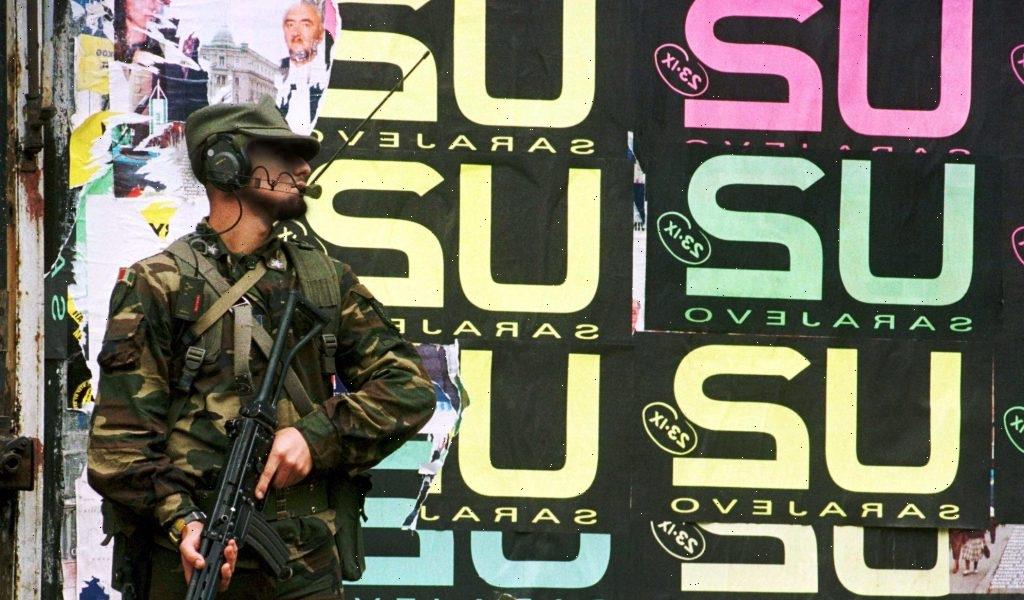Watching “Kiss the Future,” a documentary about the band U2’s relationship with wartorn Sarajevo in the 1990s, it’s hard not to think: “We’ve seen this movie before.” That’s not to do with the doc itself so much as how aspects of the 30-year-old footage from Bosnia’s brutal civil war parallel what we’ve seen in the news coverage coming out of Ukraine for the past year. Both involve stranger-than-fiction (or stranger-than-fascism) scenarios of cosmopolitan cities suddenly subject to state terrorism, which makes the Matt Damon and Ben Affleck-produced film coincidentally timely, for all its belatedness.
In a sense, “Kiss the Future” is the story of a long-distance romance, between a superstar rock quartet reaching its peak and a once-grand metropolis that’s bottoming out. In the early ’90s, genocidally minded Serbian president Slobodan Milošević tried to subject the happily mixed population of Sarajevo to ethnic cleansing by any means necessary. The area’s young people fought back in whatever spirit-lifting way they could — including founding underground discos, forming punk bands and otherwise keeping the arts alive as they dodged shelling and snipers. An American activist, Bill Carter, had the idea to enlist the stadium-filling U2 in publicizing their plight, which led to nightly satellite appearances by Sarajevo locals on the giant screens of the “Zoo TV” tour’s European leg.
The early parts of the film emphasize the scrappy nature of the whole endeavor, and Bono’s eagerness to directly engage with guerrilla telecasters in front of audiences of tens of thousands. Carter somehow got an OK on doing an interview with the singer for the Bosnian resistance’s pirate television channel, traveling to Rome and somehow bumbling his way — early Cameron Crowe style — into an audience with the world’s biggest rock star. The huge LED images of the “Zoo TV” tour were meant to satirize the proliferation of mass media, yet here was Bono, subverting his own subversion by using the somewhat tongue-in-cheek tech to aggressively advocate for peace after all, like a moth drawn back to the socially conscious flame.
The first two-thirds of “Kiss the Future” make for an especially nice buildup to these satellite-enabled moments, in which that familiar notion that rock ‘n’ roll might save the world really seems like a tangible possibility. Director Nenad Cicin-Sain makes certain to position the beleaguered Bosnians as the stars of the story early on, while U2 isn’t even mentioned until about 15 minutes into the film, after Christine Amanpour, Bill Clinton and the activists on the ground have laid out the grounds of the conflict for us forgetful Westerners. We see the inspiring stories of Sarajevo residents forming or continuing on with their own bands (including one rock drummer who taped a drumstick to his stump after losing a forearm to warfare), and learn about their resistance to misery tourists coming in to witness or exploit their pain.
If the doc becomes more diffuse in its final stretches, that’s partly out of the necessity of a disconnected storyline, as U2 essentially drops out of the picture. Bono and other members of U2 become worried that their nightly satellite calls to Sarajevo are exploitative and call an end to them, while promising to come play the country someday. That vow is fulfilled in 1997, when the band arrives in a now-peaceful city to play a stop on its “Pop-Mart” tour in a venue that had previously been an Olympic stadium and then a mass graveyard. The concert footage is great, but perhaps there was no B-roll shot at the time of the band members meeting the locals they’d advocated for from afar, which would have made for a more sentimental climax. Minimal shrift is given to Bono, the Edge and Pavarotti recording a song called “Miss Sarajevo” (after a defiant wartime beauty pageant), perhaps because Carter already documented that narrative detour in a short subject in 1995. How Bono felt about mixing satire with wartime soul on the “Zoo TV” and “PopMart” tours doesn’t come up for discussion.
It also might have been nice if the film ended more like it began, by showing more of what Sarajevo’s arts scenemakers of the ’90s are up to now in their lives, since they’re set up as real characters before their screen time diminishes. As it is, they’re seen reacting to clips of the ’97 U2 show with tears and joy, making a convincing case it really did serve as the symbolic kicker to the war that a healing nation needed.
Read More About:
Source: Read Full Article
